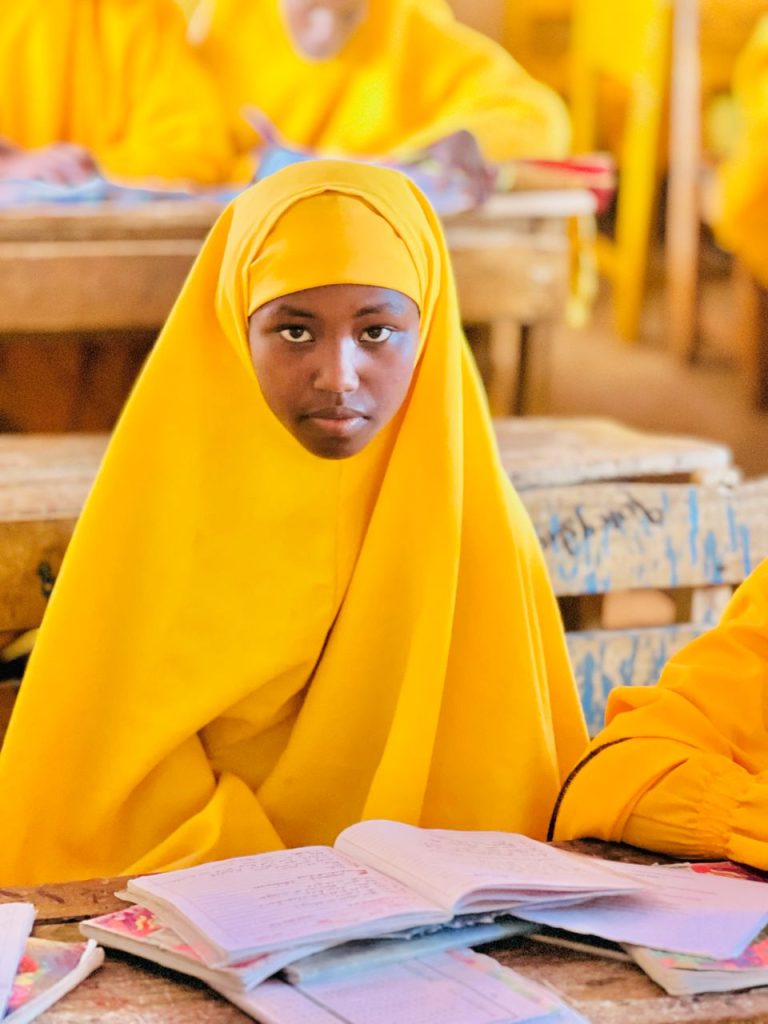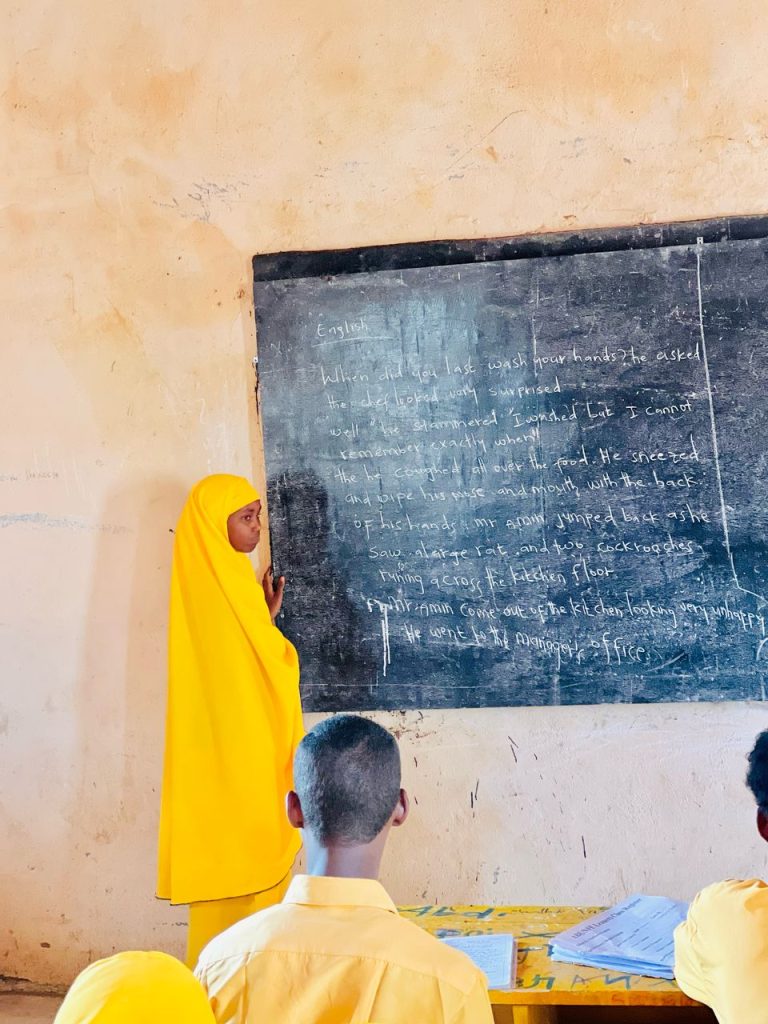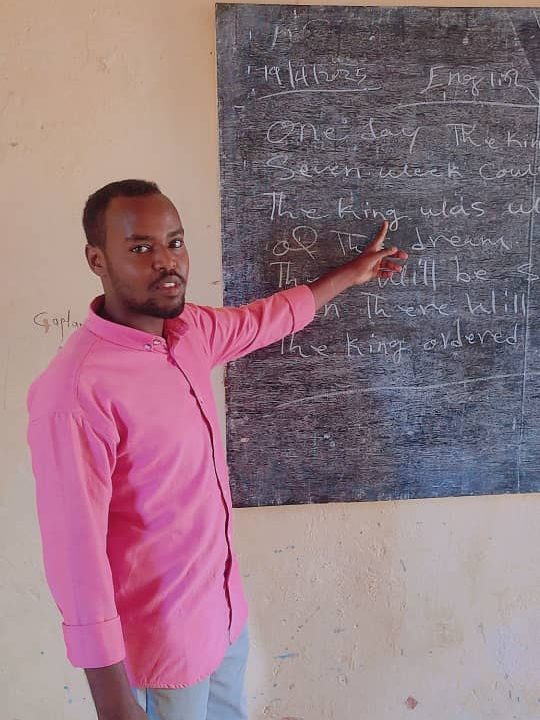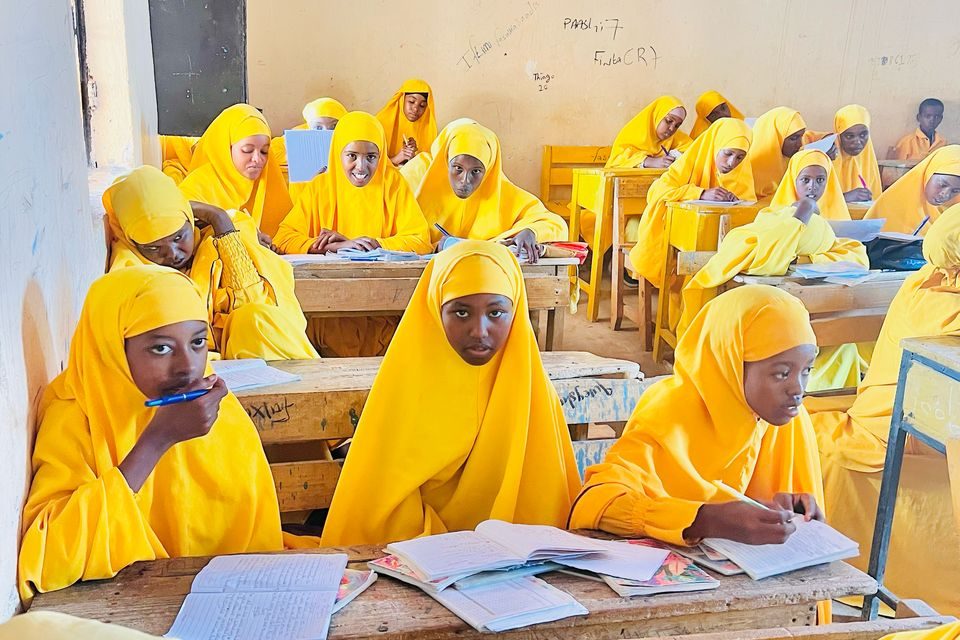From crisis to classroom – in Somalia’s refugee camps, education is a lifeline
Education in crisis is lifesaving and life sustaining. Salma is a teenaged schoolgirl who has blossomed, thanks to an FCA project that provides children in Somalia’s IDP camps with safe schools and the tools to learn.
Text: Mohamed Eisse, FCA Somalia
Photos: Abdillahi Moalim
In the vast, sun-scorched camps for internally displaced people (IDPs) that lie in Baidoa, Somalia, families crowd together under shelters pieced together from torn tarps and sticks. The air is thick with dust that swirls in endless storms, making it hard to breathe or see. Rain rarely falls here, and hope feels just as scarce.
These families once lived in villages surrounded by green fields and crops, but years of fighting and unrelenting drought destroyed their homes and farms. Now, they have nowhere to go. Baidoa, once a place of harvests and bustling markets, has become a refuge for thousands of people who have lost everything.
Life here is a daily struggle. Parents search for odd jobs to buy food, while children wander the camps, their bare feet coated in dust. For many girls, childhood ends early—forced into marriages to ease their family’s burdens instead of holding pencils or textbooks. Schools, where they exist, are crumbling buildings with broken benches and empty chalkboards. Teachers do their best, but hunger and fear make it hard for children to focus. Survival comes first; learning feels like a distant dream.
FCA Somalia wants to change this reality. The team there supports a EU-funded project in the camp to provide centres with qualified teachers, where children can learn in a safe environment. The centres have become a lifeline for families, offering not just lessons, but a chance to reclaim stolen futures.
Salma’s story

Fourteen-year-old Salma Hassan Moalim never imagined her childhood would be filled with hardship. She was born in Misra, a quiet village where her family farmed maize and beans for generations. But years of drought and insecurity changed everything. The crops failed, food became scarce, and fear replaced peace. “We were farmers,” she says. “But the drought killed everything. No rain, no harvest, no money.” When conflict erupted, the family fled to Baidoa with nothing.
Salma and her family sought safety in Darusalam camp, one of many crowded settlements in Baidoa, Somalia. They left everything behind—except each other. Her mother, Sacdio Ahmed Adam, found work as a cleaner. “We came with nothing,” Sacdio says. “We struggled even to feed the children.”
Dreams out of reach
Before joining school, Salma didn’t know what education truly meant. “I didn’t even understand the word “Waxbarasho” meaning knowledge,” she admits. Her parents couldn’t afford school materials. Many girls her age were already being married off. Without education, Salma feared her life would follow the same path.
She often felt alone and invisible. Hunger made learning impossible. “Some days I’d sit in class with an empty stomach. My head would spin, and I couldn’t concentrate,” she recalls. School felt like a distant dream meant for others.
Things started to change the day Salma was enrolled at Fathu-rahman Primary School, one of the Education in Emergency Learning Centers (ECLCs) supported by Finn Church Aid (FCA). Her journey began with a small but powerful moment—receiving a small amount of cash to buy school supplies.
“I bought notebooks, a ruler, and a blue backpack,” she says, smiling. “For the first time, I had my own things. I felt like I belonged.”

When Salma started, she could not write or read. Today, she reads full paragraphs out loud with confidence. “I love English,” she says. “And technology. I never thought I’d use a computer, but now I can type and search for things.”
Her teacher, Abdirahman, remembers her first days. “She was shy, very quiet. But you could see she was eager. Now she’s a leader in the classroom,” he says. “She’s made real progress—in reading, writing, and confidence.”
One special moment stands out to Salma. “In English class, I read lessons for the rest of the students,” she says. Just few years earlier, she could barely recognise letters. Now, she stood in front of the class, reading aloud as her classmates listened. “I felt proud,” she adds. “For the first time, I believed I could really learn—like I was no longer behind, but leading.” It was a turning point—not just in her education, but in how she saw herself.

At home, Salma often helps her mother with daily tasks. While Sacdio (Salma’s Mother) leaves early each morning to work as a cleaner Baidoa city, Salma takes care of her younger siblings and helps keep their small shelter tidy. “She’s growing up so fast,” Sacdio says with quiet pride. “When I come home tired, she’s already done what needs to be done. She’s helping the family in every way she can.” Sacdio adds.
Education gave Salma more than academic skills—it gave her courage. “The ECLC gave me strength,” she says. “Before, I was afraid to speak. Now I can say what I believe.” She has become a role model for younger girls in the camp. “They follow me when I study. They ask questions. They even call me Macallinka—teacher,” she says proudly.
Her teachers have noticed the ripple effect. “When one student grows, the others see it’s possible. Salma is inspiring her whole class,” says Abdirahman.
A Future Full of Hope
Salma’s dream is to become a midwife. The idea came from her own community, where she saw the consequences of inadequate healthcare. “In my village, many women died giving birth because there was no help,” she says. “I want to save lives.”
She remembers a nurse visiting their class and saying, “Education is your way to help others.” Salma repeats those words often. “It means everything,” she says. “Education is how I will change my life—and the lives of others.”
Despite her progress, Salma knows the road ahead won’t be easy. “Some of my friends have dropped out. Some left school last month. I don’t want to be next,” she says.
Though grateful for the cash transfers and free classes, Sacdio’s voice trembles with urgency. “We need continued support,” she insists. “Without it, how can we keep our children in school? Even with books, hunger distracts them. Parents like me still struggle to afford meals.” Her words echo the fears of many families in the camp: “If the ECLC stops, our children’s futures stop too.”
“Before, I lived in darkness,” Salma says. “Now I hold a pen. It’s my light. It’s my weapon.”
Each morning, she walks through the dusty paths of Baidoa with her backpack filled not just with books—but with dreams. “One day,” she says, “I will go back to Misra—not as a displaced girl, but as a midwife with a diploma.” Her journey is just beginning, but her light already shines far beyond her classroom walls.

Finn Church Aid (FCA) has been instrumental in turning stories like Salma’s into reality, providing critical support for education in emergencies across Somalia. Through partnerships with local communities, FCA ensures that displaced children receive not just schooling, but the tools to rebuild their futures—cash assistance, teacher training, and safe learning spaces.
By supporting FCA’s work, you empower more girls like Salma to trade despair for diplomas, and camps for classrooms. Visit our donate page to learn how your donation can light the way for Somalia’s next generation of leaders, midwives, and changemakers.
—